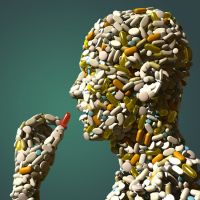The Stranger - Seattle's infamous alternative weekly - is running a back to school guide for college kids in its recent issue, and included within is a primer for collegiate drug experimentation.
While it's unlikely you got through high school without some exposure to drugs, college is when you're practically required to try them.
Don't be scared: Drugs can smell fear.
More than anything, drugs want to be your friend. Some drugs are good friends—the kind that encourage you, help you relax and celebrate, and escort you to fascinating new places. Others are bad friends—the kind that are nice until you refuse to lend them money and then they torch your house.
The primer takes a very brief look at the major players: marijuana, meth, cocaine, ecstasy, LSD, mushrooms, and heroin (curiously omitted from the list is ketamine). Even abstinence appears on the list (aww). Not surprisingly for regular readers of that paper, the primer is slightly biased overall in favor of very limited experimentation, and heavily biased against the hard drugs ("Like crystal meth, heroin is one of the rare drugs that's not worth fucking with even once") - but I don't suppose this is terrible advice for college kids, really. After all, these kids have their whole lives ahead of them to build up the raw level of bitterness and disappointment they're going to need to truly appreciate the soothing call of heroin.
At any rate, it was worth reading just to learn that some people apparently refer to marijuana as "coughy ha-ha." I really, honestly, truly learn something new every single day of my prison sentence on this rock.
 |
Wired is running a pretty interesting story about an unfortunate young drug dealer who wound up in possession of a bad batch of heroin which turned out to be MPTP, a toxic contaminant that wound up giving the young man all the symptoms of Parkinson's disease, "an incurable neurological illness that causes muscle rigidity, tremors and eventually loss of movement." It isn't particularly news anymore that MPTP can have this effect, but Wired's angle on the story follows this individual's case, as his was apparently the first documented case of MPTP causing these symptoms, which opened up a whole new model for studying the disease. Years later, this same unfortunate dealer became one of the first guinea pigs of an experimental treatment that would eventually become the standard for treating Parkinson's:
When Govea underwent the procedure in 2003, a small hole was drilled in his skull, and an electrical wire -- about the thickness of a strand of spaghetti -- was inserted into a small area called the subthalamic nucleus, part of the complex basal-ganglia system associated with steady muscle control. The wire was then connected to a battery pack, which generates a pulsing electrical current. Doctors implanted the battery in his abdomen in a separate operation (it's now typically placed under the collar bone).
"It is the predominant way people get surgical treatment for P.D. these days," said Dr. Chad Christine, a neurologist at UCSF, who is lead author of a forthcoming study on the technique.
The electrical stimulation alleviates the symptoms of Parkinson's disease, though no one knows exactly how. The most basic answer is that deep brain stimulation is setting up an interference pattern for abnormal electrical activity in the brain. "Like a jamming mechanism," Christine said.
This very treatment would not have been possible were it not for Govea's unfortunate encounter with MPTP:
Four years after his surgery, Govea's symptoms are still under control. "Look at my hand," he said, holding it perfectly still. He takes his own pills now, and he can read the newspaper without tearing it apart. Deep brain stimulation has "just changed my whole life," he said.
That's the irony of Govea's story. Advancements in the understanding of Parkinson's disease were made possible by the discovery of MPTP, which was made possible by Govea's fateful dosing with the drug. It also led to the development of deep brain stimulation. In essence, Govea has received a treatment developed from research done with the very chemical that gave him the disease being treated.
Isn't that always the way...
 |
Oh hey, in case you were curious, Helen Mirren tried acid once in her twenties. It's true! I'm serious!
She says, "I'd just taken a tab of acid - my first and last tab of acid, I can assure you - and was heading off into the fields and thinking, 'I'm not quite sure what's going to happen next.' And then, you know, the acid hit shortly after that and it was terrifying."
However the 62-year-old cannot understand how frequent users deal with the effects of the drug on a daily basis. She adds, "I don't know how people can take it time after time. I had the most wonderful time on it - it was wonderful, partly because my good friend came up to me just as the world was refracting and said, 'Don't worry Hel, it's gonna be fine. Just let go and enjoy it and it will be fine,' and I did."
"He sort of saved me and I had a fantastic time. But it's too much, too much."
Thanks, Helen, for that enlightening bit of personal revelation. You've done a lot to advance the cause of... uh... being in a gossip column, or something.
Oh and hey, by the way - Elton John used to do cocaine! I know, I had the same reaction - I was like, "No way, not Elton!" But it's all true!
The Rocket Man star claimed he was too shy to handle his fame until he was introduced to the drug in the 1970s: "It gave me the confidence to join the game. But I wasn't the kind of person who would do one or two lines. I did a gram and then called out for more."
But the drug caused John to meltdown. Besides almost killing him, he confesses it turned him into a detached and demanding diva, adding on the show: "I was once staying in a hotel in London and it was really windy outside. I rang up the office and asked if there was anything they could do about it. That's how bad it got."
Wow! Somebody call Erowid, because these are some really fascinating experience reports. I mean, can you imagine - he rang up the front office! OMG!!
 |
The L.A. Times recently ran an interview with Jack Cole, the executive director of an organization called Law Enforcement Against Prohibition, a group of current and former police officers who are fed up with the drug war and are hoping to use the credibility of their positions to promote the notion of ending the drug war. The interview is about what you'd expect if you've spent any time thinking about legalization tactics and supporting data, nothing too surprising, although his personal tale of how he as a state trooper came to consider the drug war a futile and hypocritical waste of resources is worth a look. But one tidbit definitely stuck out. Near the end of the interview, Cole is discussing how drugs that are currently illegal would be heavily regulated and made available in a world of legalization, and he's asked about the public health risks of making certain hard drugs available. His reply:
The only drug we've had any success in lowering the rate of use of in this country is tobacco. In the last 22 years we've cut tobacco use in half in this country. We didn't do that by making tobacco illegal, by arresting executives at R.J. Reynolds. The most effective thing we did was a massive education program.
Cole says his group doesn't make any specific policy recommendations; they merely suggest that "the more dangerous a drug is, the more reason there would be to legalize it, because you cannot control or regulate anything that is illegal," and that each drug would have its own policy for access. It's an interesting thought problem. The nightmare of legalization opponents is a world where society has unfettered access to the tools of its own destruction, as our self-control evaporates in the face of rampant hard drug abuse. But the kind of regulation that Cole hints at doesn't inherently mean that you'd be buying heroin out of vending machines; it might instead mean that you'd be using it under supervision if you could convince your doctor you really needed it (not as far-fetched as it may seem, as our earlier story on heroin maintenance programs in the UK suggests).
The kernel of this line of thinking, though, goes back to the days of alcohol prohibition, when a huge swath of the American population became criminals essentially overnight, with no corresponding increase in public safety or welfare. Today we have a situation where millions of people are comfortable with some amount of marijuana use per month or year, and society is not collapsing as it is. If we legalized pot, would we see a dangerous, precipitous increase in berzerk stoners roaming the streets? Possibly in the short term, sure, but alcohol regulations already provide a model for what to do with people who can't control their behavior while altered. And there's something in the back of my mind that can't help but think that making cocaine, heroin, and speed available in some fashion has a Darwinian component; our society keeps tobacco and alcohol legal, despite the fact that they demonstrably annihilate a certain percentage of the population every single day. Maybe from the perspective of our current health care system, that's not so great; but from the perspective of a democracy that ought to know better than to punish victimless crimes, it seems to make sense.
 |
Last Thursday, Congress passed legislation overhauling how the FDA monitors pharmaceutical companies, giving it new power to protect the public. President Bush is expected to sign the legislation.
Under the new law, the FDA can require pharmaceutical companies to closely monitor the use of newly approved medicines for signs of harm, much as they must do while testing the drugs to win approval. The FDA can mine large patient databases kept by Medicare, the Veterans Affairs Department and private health insurers for early warning signs.
In addition, the FDA has the authority to order quick changes to drug labels to warn of safety concerns and to review television ads before airing. Companies will be required to post results from drug trials publicly, whatever the results.
"It means this history of never showing studies that show safety problems will end," said Dr. Steven E. Nissen, a Cleveland Clinic heart specialist whose identification of heart problems caused by the diabetes drug Avandia sparked criticism of the FDA's drug-safety program this year.
Why is this important? Well, as it turns out, the old system isn't so hot:
The 422-page bill plugs holes in the government's drug-safety system that were exposed when Vioxx was linked to deaths in 2004. Beforehand, most of the FDA's muscle rested in its power to decide whether a drug worked safely enough to go on the market. But the agency had far less power to restrict use of medicines later found to be dangerous.
Instead, the FDA was forced to depend on doctors and drug makers to report side effects, a poor approach to quickly detect dangers. The FDA had to ask drug companies to recall medicines that appeared dangerous, and many simply ignored the agency's orders to study drug performance after receiving approvals.
This basically translates to a) patients taking drugs before the FDA has had time to determine if there are serious long term side effects, as well as b) patients actually not filling their prescriptions because of low confidence in their safety. Naturally this kind of legislation can't address the key issue of drugs ordered from overseas being filled with poison, but come on, you can only expect so much. At any rate, it's nice to see that when presented with evidence of, you know, the entire population being at serious risk over the course of many many years that Congress can, uh, spring into action.
 |
Newsweek recently ran an interesting piece on research into how a database of EEGs (recordings of brain wave activity) could be used in a novel fashion to try to determine the right drugs to prescribe for certain mental illnesses. Check this out:
[A]ccording to studies of hundreds of patients—CNS Response is launching larger trials this fall—"in some three quarters of patients the EEG database leads the physician to something he wouldn't have thought of," says CNS president Len Brandt. One middle-aged woman, for instance, suffered from depression for years, even after Richardson prescribed one antidepressant after another, marching through Wellbutrin, Cymbalta, Zoloft and more. Her EEG, it turned out, matched those of patients who had responded to Depakote, which is used for bipolar disorder and impulse-control disorders. She showed no signs of either. Yet on the drug and continued psychotherapy, her depression lifted in a week.
The EEG matches aren't perfect. For about one quarter of patients, the $500 analysis suggests treatments that work no better than what they'd already tried. It has proved most beneficial in stubborn cases and in those with no obvious first-line drug, such as eating disorders and addictions. A 16-year-old was repeatedly hospitalized for bulimia, purging up to 10 times a day despite being on the usual antidepressants, for instance. But her EEG pointed Greenblatt toward an anticonvulsant and a stimulant—not a duo anyone would have prescribed. She overcame her bulimia and is now in college.
That is pretty snazzy if it scales out. And of course, it's nice to daydream about how someday, the EEG database may be pointing people toward prescription MDMA....

One of our agents in the field pointed us to this delightfully unusual flickr stream, well worth a quick tour if you have an appreciation for the well-staged absurd. (Thanks Mason!)
No, not a new drug craze for Joe Average American Parent to freak the fuck out about (although if it were, it would, for once, be worth freaking out about) but a weird web comic (is there any other kind nowadays?) that ran a "Drug Experimentation Week". Follow the link to the first panel of the week, reproduced here, and click through to further madness... including, about a week after the end of the drug tests, the September 11 episode...
Another of my recent favorites is this one.
by Erik Davis And so there you are, in a fireman's coat, hurling through the wee hours across a parched and dusty lakebed in a 1979 American LaFrance firetruck, a pumper from Danville Illinois named Sparky who occasionally spits gobs fire from a flamethrower mounted on the roof of the cab. This is no ordinary Monday night.
Above you the rare shadow of the earth has morphed the full moon into a dusky half-burnt clementine that hangs there pendulous like some wandering orb on the cover of a 70s SF paperback. In the muted moonlight, you can see for once that the thing really is a sphere, and not a disc—a ping-pong jack-o-lantern arrested midflight. You think upon the old ones and what they must have made of such a vision, so unusual but still predictable to the sharper monkey minds: A call to the gods? An excuse to orgy? Proof that nature is a veil?
"Baby's on Fire" is spewing out of the iPod, and Fripp's incandescent solo mixes with Burning Man's surrounding soundscape of engines, explosions, house beats, and the rising cries of gesticulating passersby who have—wait a sec—just realized that the iconic 40-foot-tall trademark that centers their entire week of organized revelry is prematurely aflame.
—Gnat, am I hallucinating?
—Of course!
—But the Man's on fire!
—Ohshit ohshit. Mhuaahaha! GO GO GO!!!
Later, there will be arguments over motive and ethic, of responsibility and risk and the smoldering coals of living theatre. But for now there is only the Event: the disruptive eruption of novelty, of amoral surprise, of the genuinely untimely. The man is burning! Time is out of joint! Later, there will be News and Analysis and Opinion, those grubby hustlers of thought who monopolize the discourse we use to mirror the world. But for now we, or at least those of us on Sparky, laugh with exultation, with ridiculous wayward joy, because our lives happen, really happen, only in the environs of the Event, in that frothy chaos that dances ahead of the march of facts.
The Event is not history: it arises in a different kind of time, meta-magical time, nonlinear or at least orthogonal to our quotidian grind. The fire that licked the parrafin-soaked figure that Monday night was also the Oroborous licking its own tail. In a bar after the festival was over the accused perpetrator of the act spoke to my friend about wormholes and time-slips, and it did seem for a moment that we were once again beholding the old school burning men of yore, toxic and raw and stripped of firework finery. And dangerously mythic. As we scrambled off the firetruck, a lanky young fellow with a thin but prophetic beard passed us, calling to all with ears in a stentorian Masterpiece Theatre voice: The Man shall burn when the planets align, and not at the hour appointed by man.
 |
Some people still know how to make a statement, like John Lydon (aka Johnny Rotten) of the Sex Pistols. In an interview he called the Police "soggy dead carcases," and of their reunion opined, "You know listening to Stink trying to squeak through 'Roxanne' one more time that's not fun." But he also had a thing or two to say about drugs.
Lydon, 51, also criticised troubled stars Pete Doherty and Amy Winehouse, likening them to his former bandmate Sid Vicious, who died of an accidental heroin overdose in 1979.
He said: "Banging on about your drug habits is a bit old fart isn't it? You know you can use drugs for entertainment but you should be quiet about it.
"They obviously don't enjoy what they're doing and that's why you turn to drugs. That's what happened with Sid. It's a slow suicide and it's a cry for help because they're in mental pain."
This brings back one of my favorite memories of Johnny Rotten, when he was forced to do an anti-drug PSA for some legal infraction in the '80s. I believe the text of the ad went something like this: " Don't do drugs. My good friend Sid Vicious died from drugs. Drugs suck." He spoke these lines while polishing or working on a car (???), and although I remember this spot clear as day, I cannot find the video or any solid references to it on Google. Can anyone tell me, did I hallucinate this?
|

Recently @ DoseNation
|
|



















